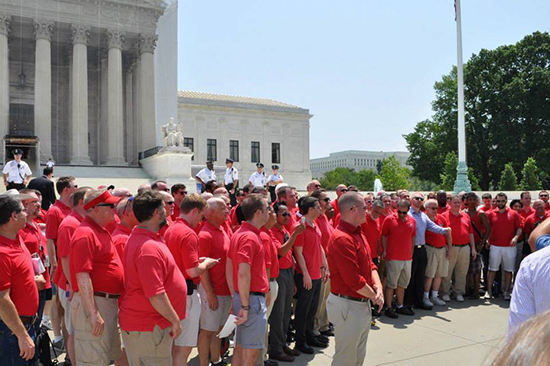
June 26, 2013, was an unforgettable and historic day for this 32-year-old gay man. Because I wasn't alive during the civil rights movement, the Supreme Court's decisions striking down Section 3 of the federal Defense of Marriage Act (DOMA) and effectively re-legalizing same-sex marriage in California were the first major civil rights advancements I'd experienced in my lifetime. June 26 offered a moment in which I felt like something I had actively fought for had made my country significantly better, more equal -- a more prefect union.
The day was especially memorable because it offered me the privilege of being in the middle of two remarkable celebrations of the rulings.
First, singing outside the Supreme Court building alongside fellow members of the Gay Men's Chorus of Washington, D.C., I became overwhelmed with emotion as we proudly performed the national anthem. Surrounded by supporters and the media, the Chorus' presence that day to lift our voices in song perfectly represented the central part of our mission to champion gay equality.
There were tears rolling down my face and sweat rolling down my back, yet at the forefront of my mind were words from the prophet Amos. I felt as if I had literally just witnessed "justice rolling down like water, and righteousness like an ever-flowing stream" (Amos 5:24). This was a day that I could never have imagined as an adolescent, when I struggled to reconcile my sexuality with religious teachings. From that day to this, the journey of the gay rights movement in my memory had seemed to progress at a glacial pace. Surely these rulings marked a watershed moment when, rather than a slow trickle of justice, a true rushing stream had been unleashed.
Even as we sang, bells rang out from church towers in a musical outburst of pure joy. But for many of us, the day would not be complete without time for prayer.
I was one among hundreds of people gathered that evening for a special prayer service at Washington National Cathedral, where, just hours earlier, the bells of the central tower had rung out in celebration of the marriage rulings. I have been at the center of the Cathedral's growing outreach to the LGBT community since the Very Reverend Gary Hall was called as its new dean in 2012, and in working with him I had planned for a response to the rulings that included a press conference with interfaith leaders who support these recent Supreme Court decisions. There Dean Hall spoke to what, for me, is the most exciting aspect of the Cathedral's advocacy in this realm. "Today's rulings advance civil marriage equality," he said, "but they should also serve as a call for people of faith to embrace religious marriage equality." He noted, "Countless faithful couples have lived out their lives in committed same-sex relationships." Many of those LGBT couples, and their allies, joined us in the Cathedral that evening for the special "Service of Thanksgiving Celebrating an Increase in Compassion and Equality" in the Cathedral's nave.
What I found so poignant and emotional about the Cathedral's response was that, through its advocacy, an important message of inclusion was being heard or read by thousands, and that what the Cathedral is doing is rooted in our Christian faith, as Episcopalians, and that all people are beloved children of God. I couldn't help but wonder what kind of impact it would have had on me when I was struggling as a child if had I heard news that the "spiritual home for the nation" was ringing its bells to celebrate same-sex marriage. This was a day to pause and appreciate how blessed I am now to be part of a church that affirms my full participation and is brave enough to take serious risks.
Perhaps New York Times columnist Frank Bruni's op-ed the next day registered most for me, though, when he suggested that the two court decisions have not only legal ramifications but "another kind of effect, deeply emotional, potently symbolic and impossible to measure -- but arguably much more sweeping." That effect, I believe, might begin with marriage equality but doesn't end there by any means. Along with Bruni, I had also recently enjoyed the honor of spending quality time with both Jane and James Clementi, the mother and brother of Tyler, respectively, when they came to the Cathedral for a reception that Dean Hall hosted for LGBT leaders. Bruni wrote that Mrs. Clementi told him that "while the court's rulings in the DOMA and Prop 8 cases were 'just a start,' they affirmed her belief in 'the trajectory of where we're going.'" Jane's sense of that trajectory was made poignantly clear when she also noted that the rulings "might even save lives."
We need more days like June 26. As the battle for marriage equality continues nationwide, we will also need more action both from our government and communities of faith to add to the rolling stream of justice.
Richard M. Weinberg is director of communications at Washington National Cathedral and co-chair of its LGBT ministry group.
